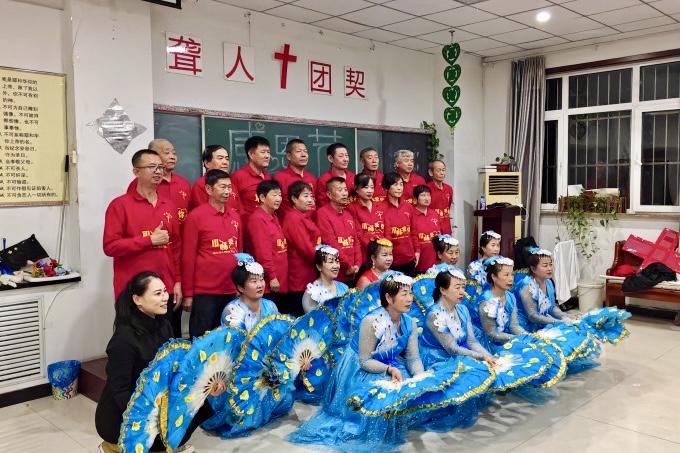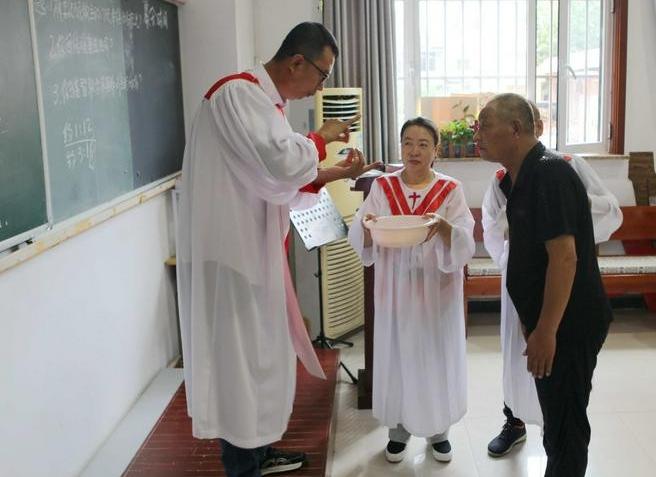Due to differences in communication methods and cultural backgrounds, only a small number of the approximately 28 million deaf individuals in China have been reached by the gospel and come to faith in Christ. After becoming Christians, they face even greater challenges in accessing pastoral resources than hearing Christians. In recent years, to address the spiritual needs of the deaf community, churches in cities such as Beijing, Hangzhou, and Shenyang have launched dedicated ministries for the deaf, and more and more hearing co-workers have actively joined these efforts, providing support through sign language interpretation, visitation, and pastoral care to help deaf believers integrate into the church community.
Wang Shengjun, an assistant pastor from a church in Anshan, Liaoning Province, is one such minister devoted to serving the deaf. He has been involved in this ministry since 2009, accompanying deaf believers for 16 years. Recently, the Gospel Times, an online Chinese Christian newspaper, spoke with Pastor Wang to gain insights into the spiritual lives of deaf Christians and to learn more about his current pastoral approach and reflections.
Entering the Community to Understand the Traits of Deaf Believers
"When I actually began ministering to the deaf, I discovered many differences (from serving hearing individuals)," Wang shared. One of the most prominent distinctions is the language diversity. Despite the existence of the Chinese National Sign Language, the localized sign language "dialects" are widespread. Even within the same region, deaf individuals of different ages and educational backgrounds may use varying forms of expression. As a minister, Wang emphasized the need for continuous learning and adaptation to navigate this complex linguistic landscape.
Another key difference lies in cognition and communication due to their distinct life experiences. Many deaf believers also lack access to systematic theological training, making it necessary to present biblical teachings in a more grounded, simple, and direct manner. "They struggle to understand deeply theological content, and even if they manage to learn it, it is difficult for them to pass it on to others in the community," Wang explained. Although several deaf co-workers in the fellowship have been trained to preach, their sermons still require review by him.
Wang also highlighted another important trait of the deaf community: a heightened sensitivity in interpersonal relationships. While they deeply long for acceptance, they also maintain strong boundaries with the outside world. "They tend to form close-knit circles and only associate with those they've established a relationship with. It's not easy for outsiders to break into these groups," he observed. Furthermore, deaf believers may become possessive of the pastor's attention. If the minister spends too much time with one person, others may feel neglected or dissatisfied.
Therefore, building trust requires significant time. "It took me several years to truly become part of their community," Wang noted. He emphasized the importance of maintaining the right balance in relationships, which is neither too distant nor too close, to preserve unity within the fellowship.
Transforming Lives Through Lives, Rooted in Scripture and Daily Life
Wang emphasized that the core of the fellowship's pastoral work remains focused on helping believers become grounded in biblical truth and build a solid spiritual foundation. Members are encouraged to hand-copy one chapter of the Bible and read two chapters daily, with designated individuals following up. In preaching, the fellowship adheres to the principle of "applying doctrine to daily life," emphasizing foundational truths. Recently, they completed studies on the "Lord's Prayer" and "The Ten Commandments" and are now exploring the Book of James.
"We continue to uphold the principle of influencing lives with lives to demonstrate a living, authentic Christian faith rather than a rigid or theoretical one," Wang explained. While many deaf believers still struggle to articulate complex doctrines clearly, their lives are gradually and noticeably being transformed. "They are learning to love one another within the fellowship and their families, and they sometimes express appreciation to us ministers through delicate actions, which deeply move us."
Looking ahead, Wang shared, "We're not aiming to train deaf missionaries or set them up as role models for others right now." The hope is simply that they come to truly understand the salvation of Christ and learn to live out his love and forgiveness in their daily lives.
Starting with What They Can Do in Ministry
Wang acknowledged that, at present, deaf believers still face significant challenges in fully participating in church ministries as the hearing members. "Language remains a major barrier. Without interpretation, it's difficult for deaf individuals to communicate effectively with other co-workers or seekers," he explained. As a result, they are currently unable to take on roles that require direct interaction, such as reception.
However, the deaf community has demonstrated remarkable talents in supporting behind-the-scenes work. "Several believers in our fellowship work in construction and interior design, and they are highly skilled," Wang said. During a recent church renovation, these members personally installed furniture in the activity room. Some even volunteered to help decorate fellow believers' homes, offering a unique form of service.
Coda Education: New Path for Deaf Families to Pass on Their Faith
In recent years, a new concept has emerged within deaf ministry circles—"CODA education (Children of Deaf Adults)," referring to the spiritual influence of hearing children born to deaf parents through the establishment of Christian families. The goal is for these children to serve as a bridge between the deaf and hearing communities. Discussing this topic, Wang explained that most fellowship members are middle-aged, and many of their children have already become independent. While few regularly accompany their parents to church, Wang has had the opportunity to speak with some of them.
He recalled that in the early days, some children questioned whether their parents truly believed in the Lord, as they observed discrepancies between their parents' behavior at church and at home. Wang would explain to them the process of spiritual growth. Over time, as the children witnessed changes in their parents' lives, their attitude toward faith shifted.
Wang noted that many children have testified about these changes: their parents, once quick-tempered, have become gentler; once withdrawn, now positive. "Some even express shame," Wang shared, "when they see that we, who aren't even their close ones, are willing to learn sign language just to accompany their parents."
He believes the foundation of "Coda education" lies in the parents' spiritual maturity. While most deaf believers are still in the early stages of growing roots in their faith, Wang is confident that as they continue to mature in the truth, their transformed lives will impact their children. This influence may move their children from simple exposure and understanding of the faith to personal belief, and eventually, some may feel called to serve the deaf community themselves.
Not Obligation, but Grace
When asked whether more churches should be encouraged to engage in disability ministries, Wang emphasized that such service should never be imposed. He responded that service must come from the prompting of the Holy Spirit and a willing heart.
He views the opportunity to see and serve the disabled community as a special grace and calling from God. Wang remarked that it is a glorious mission to bring the salvation of Christ to the least of these.
- Edited and translated by Poppy Chan












